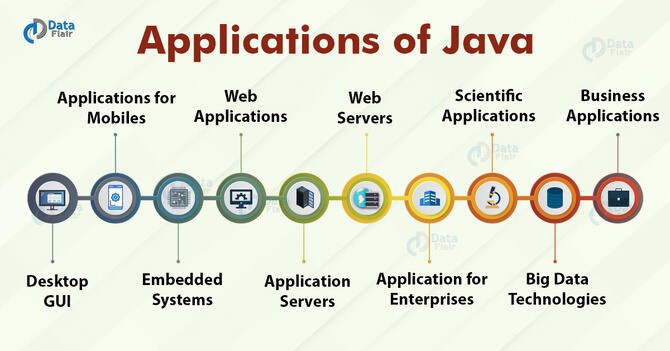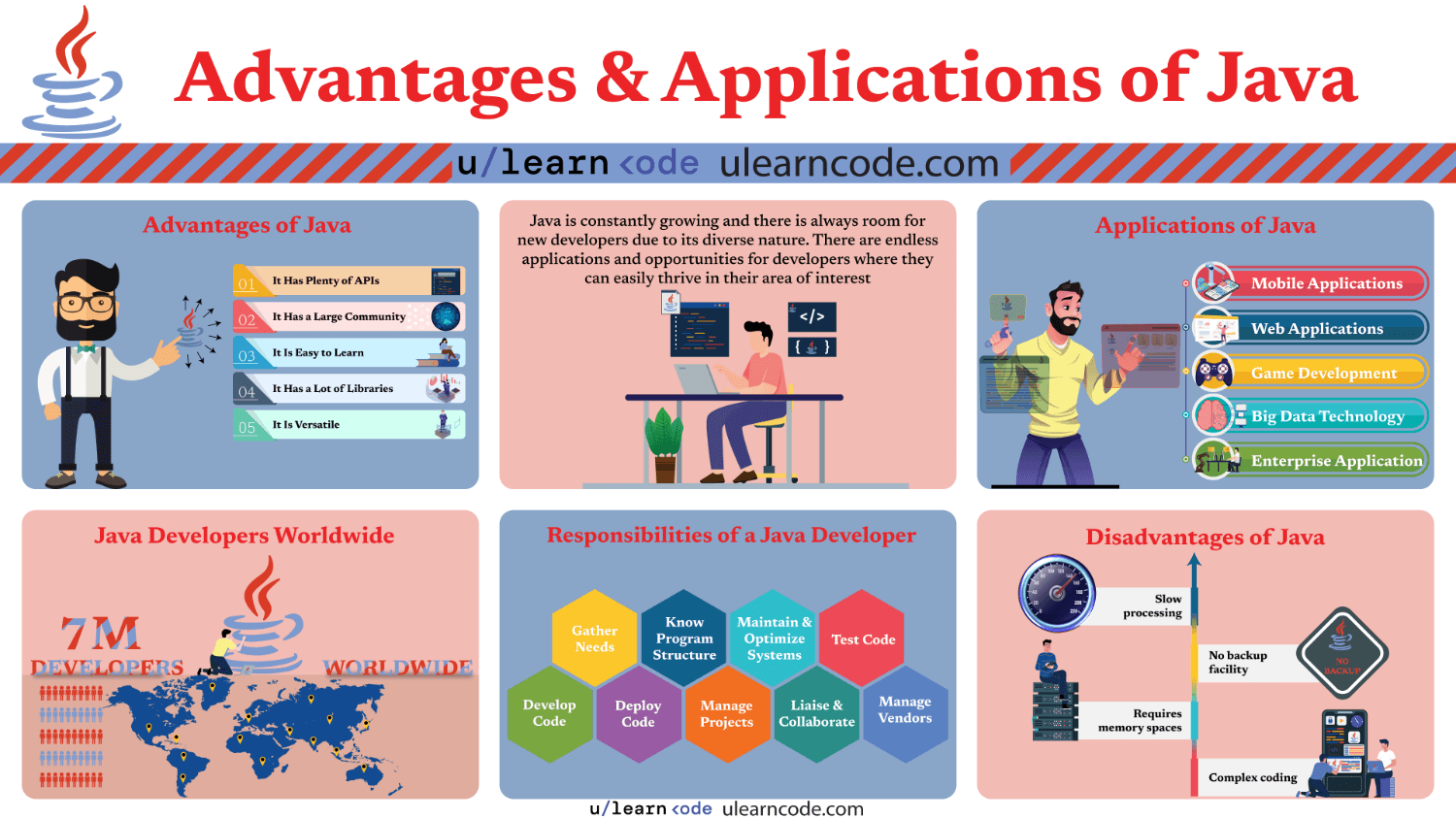Contents
Java is being used in billions of devices from electronic equipment to computer applications. The language is extremely diverse and flexible, which is one reason for its popularity. It is almost everywhere in the technological world.
We interact with Java-based devices, applications, machinery, etc. in our everyday life. But what exactly makes Java so popular? The reason is its extreme diversification and usability.
Java programs can easily run on multiple platforms once they are coded. Programmers can execute their one-time written code on almost every operating system if it supports JRE (Java Runtime Environment).
The wide usage of this language surely gives us a clue of its large number of applications, whether it’s in the digital or real world. In this article, we are going to discuss some of its major applications, but remember that there are endless opportunities for Java programmers.

Let’s first discuss 6 major Java applications with a high number of opportunities for new and even experienced developers.
What Is Java Programming Used for?
This language has applications in both the real and digital world. The language is widely used in backend systems, web and mobile applications, servers, scientific applications, and big data technologies.
If we look around, most of the Android applications we use are programmed in this language. Most financial applications such as trading apps are built upon Java, and the language is also widely used in Big Data technologies such as Hadoop.
Let’s discuss some of the major Java applications listed below:
- Mobile Applications
- Web Applications
- Game Development
- Big Data Technologies
- Enterprise Applications
- Cloud-Based Technology
1. Mobile Applications
The Android OS is based on this language, and a huge percentage of Android applications are also based on Java. Many programmers call it the only official language for mobile applications, as it provides the base for the whole Android platform.
Development software like Android Studio and Kotlin is also very much compatible with the language. There are numerous mobile development courses available that concentrate on this software for mobile application development.
Java Micro Edition (Java ME) further facilitates cross-platform development for mobile applications that can run on multiple platforms. The language is certainly dominant, but there are some other mobile development languages that provide better frameworks with more flexibility.
2. Web Applications
Java ensures the security of its coded applications, along with ease of programming for developers. It is widely used to create any type of web application by utilizing:
- servlets
- struts
- JSP (Java Server Pages)
- Hibernate
- Spring
Servlets and JSP are used in combination to code the backend of web applications to develop the logic of these web-based programs. Several web application development courses provide you a complete roadmap to develop cross-platform web programs.
Java is widely used in eCommerce sites where many open-source services such as Broadleaf are used. Many web-based Google products such as Gmail, Google Slides, Google Sheets, etc. are also based on this language.
There are some other web application development languages such as JavaScript that are made to work with web applications. So, JavaScript is certainly a better choice if you want to learn web application development.
3. Game Development
Java is a dominant language even in the game development industry. It might be not that popular for console or computer ones, but it is widely used in Android games. Almost all Android games use it in one way or the other.
The language itself can only be used to develop 2-dimensional games, but the jMonkeyEngine engine removes this barrier and allows Java developers to create 3-dimensional games as well. There are a variety of game development courses available that are focused on the Java language.
The language also supports Dalvik Virtual Machine (DVM) which makes it more compatible with the Android platform for game development. Java is not perfect in this area, and there are certainly some better game development languages such as C++, C#, and Lua that allow you to create console and PC games.
4. Big Data Technology
Big Data is a growing technological domain that deals with complex datasets to collect, clean, and analyze different types of information, trends, and patterns. Java is a frontline language for most big data applications and frameworks.
One of the biggest and most popular big data frameworks, Hadoop, is also written in this language. The memory management and garbage collection features of Java further facilitate the purpose of big data technologies.
There are some Big Data Technology courses available to explore where different industry roles and Java purposes are defined for this domain.
Some Big Data related sub-projects of this language include:
- Apache Hadoop
- Apache Spark
- Apache Mahout
Some of the other languages for Big Data include Python, R, and Scala, which are making quick progress in this emerging industry.
5. Enterprise Applications
Enterprise applications need a huge working ecosystem and Java covers this gap with one of their Enterprise-specific platforms called Java Enterprise Edition or JavaEE. This platform provides a complete ecosystem with proper APIs and an excellent runtime environment that helps programmers with scripting.
According to Oracle Corporation, around 97% of the enterprise applications use this language to build scalable languages.
The reason that it is used so widely in the enterprise world is its excellent security and scalability opportunities. There are some great Java courses available by talented instructors for a complete overview of this language.
Java is also widely used in banking applications where tons of processing is needed, and it provides a strong backend to regulate all application operations without any interruption. JavaScript and Python are two other appropriate languages for enterprise applications that might work better for some enterprises.
6. Cloud-Based Applications
Cloud applications are a new norm for the whole IT industry where all resources are hosted on the cloud for easy access. SaaS, IaaS, and PaaS development is at its peak where demand for cloud applications developers is also rising.
Java has a very distributed nature and its flexibility with web-based, mobile, and computer applications cannot be neglected. It also stands out in the case of cloud-based applications, where numerous development tools are introduced such as Oracle Java Cloud Service.
If you are interested in Cloud applications, then here are some Cloud-based App development courses where SaaS, IaaS, and PaaS development is highlighted. Moreover, some other languages for cloud-based applications such as PHP, .NET, and Python are also available.
Why Should I Learn Java?

Java has been around for over 25 years, and it is still one of the most versatile, flexible, well-structured, and easily readable languages. It is a dominant language with over 3 billion active devices using it in one way or another.
If that is not convincing enough, then here are some solid reasons to learn Java and use these development skills in specific domains:
1. It Has Plenty of APIs
Java Application Programming Interfaces (APIs) include different types of packages, classes, and interfaces. On a broader spectrum, these APIs are classified as:
- Official Java core APIs
- Optional Java APIs
- Unofficial APIs
These APIs are very helpful in the development and integration of different functions in applications where developers do not need to go deep into logic and implementation.
2. It Has a Large Community
Java is a completely free and open-source language with a large community that includes beginner, advanced, and professional level programmers who provide contributions and support to improve the language.
There are separate communities of Java developers on StackOverflow and Java Forums where people discuss, share, and solve each other’s development problems without charging a cent.
3. It Is Easy to Learn
There is no denying that the syntax of the language is similar to that of English. So, it’s very easy for a new programmer to learn the basics, but things get complicated in advanced logic and programs.
4. It Has a Lot of Libraries
Java has an abundance of libraries that make the development process much easier and more enjoyable. All of its libraries are open-source including:
- JHipster
- Google Guava
- Maven
- Apache Commons
These libraries can be student, altered, or changed according to the developer’s requirements.
5. It Is Versatile
Java is such a versatile and flexible language that we see its applications in almost all domains whether it’s gaming, mobile, web, or any other type of development. The language is also being used in many devices to add various functionalities. This versatility gives endless opportunities for developers.
Summarizing
Java is constantly growing and there is always room for new developers due to its diverse nature. There are endless applications and opportunities for developers where they can easily thrive in their area of interest.
The language is here to stay because it is being used in popular platforms like Android and billions of other devices. So, it’s completely worthwhile to invest your time in learning Java.